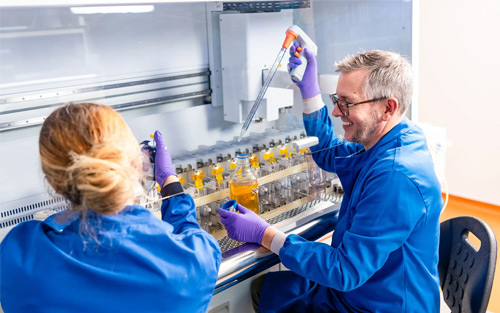Newsroom
Breakthrough innovation specialist Cambridge Consultants has developed BacillAi, a concept system that harnesses Artificial Intelligence (AI) and standard, low-cost hardware to improve treatment monitoring of tuberculosis (TB) in resource-limited countries. With TB the second largest cause of death by infectious disease in the developing world, the BacillAi system is part of Cambridge Consultants’ continuing mission to move AI beyond the hype, addressing practical, high-impact challenges and improving lives on a global scale.
TB’s high mortality rate is due to a variety of factors, including a lack of available, affordable diagnosis and inconsistent results acquired in patient follow-up. TB is monitored by taking a sputum sample and manually counting cells under a microscope. In low-resource countries, this is very difficult. There are few skilled staff working in difficult conditions. Clinicians may need to review ten patients per day, while for each patient they may need to count hundreds of cells through a microscope. This leads to eye strain for clinicians and poor quality, slow results for patients.
Using machine intelligence to achieve the seemingly impossible
BacillAi is an end-to-end concept system that uses a smartphone to capture images from an ordinary laboratory microscope. Stained sputum sample images are analyzed using a deep learning algorithm, specifically a convolutional neural network, to identify, count and classify TB cells, in order to determine the disease state of the patient. The results of the test are returned to the clinician via a dedicated app. An automated system to count cells and classify treatment progression offers a variety of benefits, including increased consistency, higher throughput and the automatic digitization of results.
The development of BacillAi was a hugely multidisciplinary project, requiring an expert team to overcome a series of technical challenges. These include:
- Developing a high-performance AI system that functions with sub-optimal images (such as low contrast) and that can be implemented on devices with limited computing power
- Designing an imaging system and phone mount that easily aligns the smartphone camera to the microscope optics and relays good images
- Developing an artificial sputum and culturing bacterial cells to create the large number of slides required to support AI training
- Bringing the system together for the user with an intuitive, user-friendly app interface and easy-to-assemble hardware
Cambridge Consultants works at the leading-edge of advances in AI, applying deep learning in applications including anomaly detection in telecommunications networks, self-driving cars, frictionless user interfaces and medical diagnosis and treatment. TB cell identification is particularly difficult due to the presence of other similar looking cells in sputum samples, variance in stain strength and variance in color between imaging devices. These conditions cause traditional, rule-defined computer vision techniques to fail, as they are unable to account for such breadth of data. By contrast, this rich, varied dataset creates the ideal conditions to train a robust and accurate deep learning system for cell identification.
Dr. Kathleen England, senior TB diagnostic advisor and formerly of Médecins Sans Frontières, commented: “The only monitoring tools we have today for assessing whether a TB patient’s treatment is working are AFB smear and culture, when available. The reading of slides requires training and highly-skilled microscopists, which are currently a limitation in many countries.
“A system that removes human variability in counting, reduces skill level, increases throughput and shares information via a network would be very beneficial for patient smear examination.”
Richard Hammond, Technology Director at Cambridge Consultants, commented: “Our team is focused on applying our deep learning expertise to real-world, high-impact challenges in healthcare. Today, we’ve demonstrated the feasibility of a deep learning-based system using practical and readily-available hardware components in the treatment of TB. Eventually we could see a platform like BacillAi assisting doctors to diagnose and monitor treatment for a host of conditions beyond TB in low-resource settings.”
BacillAi was developed using Cambridge Consultants’ purpose-built deep learning research facility. This laboratory implements NVIDIA DGX POD™ architecture using NetApp ONTAP AI, which provides petabyte-scale, high-performance, all-flash storage.
Notes to editors
About Cambridge Consultants and Capgemini
About Cambridge Consultants
Cambridge Consultants (CC) is the deep tech powerhouse of the Capgemini Group. Deep tech is a mindset, a bold strategy that harnesses radical science and engineering to achieve things no-one else can. It delivers transformative business value and growth for our clients, who gain defendable commercial and operational advantage from new-to-the-world products, services and processes that they own. We overcome the ultimate business challenge: turning something that doesn’t yet exist into a reality. Our advice is built on practice, with over 750 scientists, engineers, designers and consultants working globally across more than 20,000 sq. m of state-of-the-art R&D facilities. As part of Capgemini Invent, CC is backed by 340,000+ Capgemini team members in more than 50 countries.
About Capgemini
Capgemini is a global business and technology transformation partner, helping organisations to accelerate their dual transition to a digital and sustainable world, while creating tangible impact for enterprises and society. It is a responsible and diverse group of 340,000 team members in more than 50 countries. With its strong over 55-year heritage, Capgemini is trusted by its clients to unlock the value of technology to address the entire breadth of their business needs. It delivers end-to-end services and solutions leveraging strengths from strategy and design to engineering, all fueled by its market leading capabilities in AI, cloud and data, combined with its deep industry expertise and partner ecosystem. The Group reported 2023 global revenues of €22.5 billion
Get The Future You Want
Visit us at www.capgemini.com




